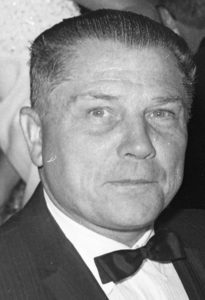One night in the fall of 1975 a guy called The New & Observer’s Metro Desk and an editor over there transferred him to me. Maybe he sounded crazy. I was an investigative reporter and in those days Metro gave me all the crazies.
Anyway, this guy had a red hot tip: he knew where Jimmy Hoffa was buried, at least, that’s what he said.

For those of you who were born late, Jimmy Hoffa, president of the International Brotherhood of Teamsters, was the most infamous labor leader of his era. I’m not going into a long who-shot-john about Hoffa. Just consider these two facts: he served time for jury tampering and mail and wire fraud and conspiracy while he was president of the union; he got out early after he was pardoned by the President of the United States.
Hoffa, they say, was “involved” with the Mafia. Maybe the Mafia murdered him. Maybe not. All that was known for sure is that he went to the Machus Red Fox, a restaurant in a suburb of Detroit, on July 31, 1975, and no one had seen him since. The FBI was looking everywhere for his body.
So you see now why this was such a fabulous tip.
The man on the phone, who turned out to be a 49-year-old escaped convict named Chuck Medlin, was offering me the story of a lifetime. A cellmate had told him where Hoffa was buried and now he wanted to tell me.
There were two problems with the tip, both fatal: One, he wanted me to drive to Greensboro, N.C., to interview him without giving me anything to establish his bona fides. I had a rule against that. And, two, I didn’t believe him. So I passed. So did reporters from at least two other North Carolina newspapers, I learned later.
So imagine my surprise when I read in the paper a few weeks later that Medlin had conned 60 Minutes out of $9,000 with his song and dance about Jimmy Hoffa.
Medlin told 60 Minutes that Hoffa was buried in a cement coffin off the coast of Key West. On the way down there to show a 60 Minutes film crew and reporter the exact location, Medlin disappeared — with 60 Minutes’ money.
Did I take any pleasure in having made the right call while the Big Boys in New York stubbed their toes?
Does a bear live in the woods?
Postscript: Jimmy Hoffa’s body has never been found.
Coming Friday: Here’s A Dime, Have Fun
